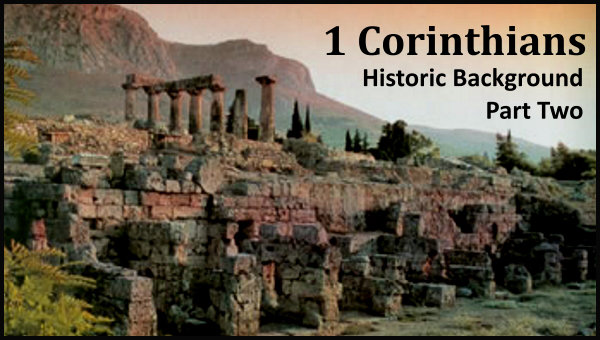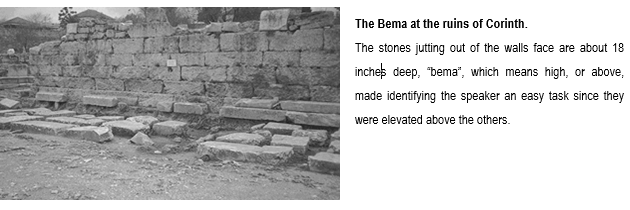By Tyson Thorne

Upon his arrival in Corinth, Paul met new friends, a Jewish couple, Aquila and Priscilla by name. They were from Rome, originally, but relocated to Corinth when Claudius (who reigned AD 41 to 54) “had ordered all the Jews to leave Rome.” This edict was pronounced in AD 49 or 50, though the circumstances are largely unknown. According to Suetonis, a Roman biographer of emperors, there was a constant series of Jewish riots. The reason for these riots is uncertain, but appeared to center around an individual named Chrestus. The apparent similarities between this name and that of Christ (Christos, in Greek) have lead some to believe it was Jewish rioting against Christians. There are many examples of Jews doing just this throughout the book of Acts. This reaction evidently lead to the expulsion of Jews and Christians, as is discussed by Randall Weis below.
In ancient Rome, Christians were officially classified as a Jewish sect among other Jews. One example of this fact is seen in that as early as the middle of the first century, Rome expelled the Christians along with all the other Jewish residents. Their welcome came “to an end with Claudius’s edict in AD 49. Christian and non-Christian Jews alike were expelled from the city. [1]
To understand the Jewish riots against Christians, one must understand Christianity from the Jewish perspective.
Jews understood, as did Romans and even early Christians, that Christianity, like the Pharisees, Sadducees, Essenes, Zealots, Sicarii and Brigands, were a sect of Judaism. Unlike the other sects, however, Christianity’s leader claimed to be God, and was therefore a heresy and an abomination to the nation of Israel. Many Jews of the first century, and even today, believed with some Biblical foundation that they lost their purchase on the land and were taken captive because of their unfaithfulness to Yahweh. They were not, and many still are not, willing to to trust anything that claims equality with Yahweh. Fearing that they may never regain the land, Jews put down the Christian sect whenever possible.
Needing income until Timothy arrived with supplies, Paul teamed up with Aquila in their tent-making business. Seeing as how Paul had the same skill, he joined their business and worked with them during the week. On the Sabbath, however, he returned to his usual pattern of preaching Christ in the synagogue. This lasted until Silas and Timothy rejoined him, at which time he devoted all his time to preaching. This lead to an important turning point in Paul’s ministry.
Once more, the Jews opposed him and became abusive. Tiring of this all-too-common event, Paul demonstrated his frustration with his own people by shaking out his clothing and informing them that they were no longer worthy of the gospel. “Your blood be on your own heads!” he said. “I am clear of my responsibility, from now on, I will go to the Gentiles.” This is an important turning point for Paul – and for us! It is in part due to the Jews’ blindness to the Messiah that the door is opened to the Gentile nations. Paul turned and left the assembly and went next door to the home of a Roman official, Titius Justus, who worshipped Yahweh. This his initial attempt proved successful, not only bringing the man to Christ, but also a synagogue ruler and many Corinthian natives. The gospel now had a foot in the door in one of the most pagan cities of the day.
If Paul’s initial successes were not encouraging enough, the Lord prompted him to further service in Corinth through a special vision. Paul did serve there for a little over a year and a half! God protected Paul, even though the Jews once more were planning his demise. Uniting together, they had Paul arrested and brought before the Roman governor Gallio. Gallio was an important ruler, having jurisdiction over the entire region of Achaia (not just Corinth). His brother, Seneca, was also outstanding in the Roman Empire as a philosopher. Further, he was in line for a high office in Rome. For this reason, Gallio was familiar with the Jewish problem with Christianity, and of Rome’s decision to have both groups kicked out of the capital.
When Paul was brought to the Bema where he would address Gallio, however, the proconsul decided to uphold Rome’s unwritten policy toward Christians and had the case thrown out of court. He could not see how a religious dispute among Jews concerned the state. This decision was important, as it implied that Christianity was indeed a division of Judaism and thereby protected by Rome as a recognized religion. Ironically, Gallio did make it to Rome, but was soon after put to death by Nero – the first emperor to begin persecuting Christians. This change in policy regarding Christians came about as a direct result of Paul’s time in Corinth, as well as Jewish revolts against the Roman Empire. The photo is of the Bema ruins at Corinth. The stones jutting out of the wall’s face are about 18 inches deep. Bema, which means “high” or “above” made identifying the speaker a simple task since they were elevated above the others. This photo is of the location where Gallio handed down this meaningful descision, about which Justo Gonzales noted:
But the distinction between Christians and Jews became clearer as the church gained more converts from the Gentile population, and the ratio of Jews in its ranks diminished. There are also indications that, as Jewish nationalism increased and eventually led to rebellion against Rome, Christians – particularly the Gentiles among them – sought to put as much distance as possible between themselves and that movement. The result was that Roman authorities began to take cognizance of Christianity as a religion quite different from Judaism. This new consciousness was at the root of two-and-a-half centuries of persecution by the Roman Empire, from the time of Nero to the conversion of Constantine.[1]
Not satisfied with Gallio’s decision, the Jews turned on one of their own, a synagogue ruler named Sosthenes, and beat him in front of the court. Unmoved, Gallio stood his ground and had Paul released. Paul stayed a while longer, before God moved him on to Ephesus. It would be some time before he would return to these people and the church that began here on his third missionary journey.
The lesson of Corinth is that, regardless of the world’s sinfulness, and the Jews’ shortsightedness, God will work His will – even in a place such as Corinth. Perhaps our minds are not too distant from that once great city. Perhaps there once were all kinds of ungodly abominations resident therein, but the mind of the Christian is no longer such a place, it is the mind of Christ. Yet, just as Christianity struggled to take hold in Corinth, so often does it struggle in our mortal bodies. As Paul wrote the believers of Corinth, his words are also written to us. May we heed them even more successfully than our brothers of the first century.
________________________[1]Randall A. Weiss, Jewish Sects of the New Testament Era, (Cedar Hill, TX: Cross Talk) 1994.
[1]Justo L. González, The Story of Christianity, Volume 1, (Harper&Row Publishers, San Francisco) 1984.
|
|

